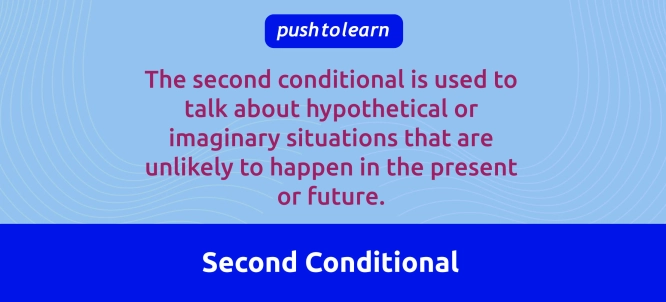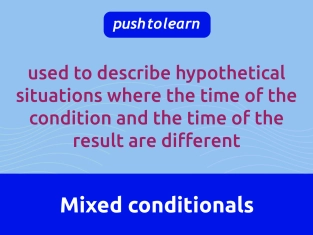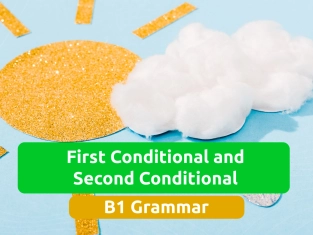by PushtoLearn
Segundo Condicional en Inglés: reglas, uso y ejercicios
Tabla de contenidos
- Segundo Condicional – Ejercicios
- TLDR
- ¿Qué es el Segundo Condicional (Second Conditional)?
- Estructura del Segundo Condicional (Second Conditional)
- Variaciones del Segundo Condicional
- Segundo Condicional (Second Conditional) vs. Primer Condicional (First Conditional)
- Errores Comunes en el Segundo Condicional (Second Conditional)
- FAQ
Segundo Condicional – Ejercicios
Estos ejercicios se centran en el Segundo Condicional
TLDR
✔️ Segundo Condicional = Situaciones imaginarias (If + Pasado, Would + Verbo)
✔️ NUNCA uses "would" en la cláusula con "if"
✔️ Usa "were" en lugar de "was" en inglés formal
✔️ "Could" y "might" pueden sustituir "would" para diferentes significados

¿Qué es el Segundo Condicional (Second Conditional)?
El Segundo Condicional se usa para:
✔️ Situaciones imaginarias → "If I were rich, I would travel the world."
✔️ Posibilidades irreales → "If she had wings, she could fly."
✔️ Consejos y sugerencias educadas → "If I were you, I would take the job."
📌 Dato Curioso: El Segundo Condicional habla de situaciones imposibles o poco probables, mientras que el Primer Condicional habla de situaciones posibles.
Estructura del Segundo Condicional (Second Conditional)
👉 If + Pasado Simple, would + Verbo base
✔️ Ejemplos:
-
If I won the lottery, I would buy a house. (Situación imaginaria)
-
If she studied harder, she would get better grades. (Posibilidad irreal)
-
If we lived in Paris, we would eat croissants every day. (Vida hipotética)
📌 Consejo: La cláusula con "if" describe la condición (Pasado Simple), y la cláusula principal muestra el resultado (Would + Verbo Base).
Variaciones del Segundo Condicional
🔹 Usar "could" o "might" en lugar de "would"
✔️ If I had more time, I could learn Spanish. (Habilidad)
✔️ If she tried harder, she might win. (Posibilidad)
🔹 Usar "were" en lugar de "was"
✔️ If I were you, I would take the job.
✔️ If he were taller, he could be a basketball player.
📌 Consejo: En inglés formal, se usa "were" en lugar de "was" con I, he, she, it en oraciones del Segundo Condicional.
Segundo Condicional (Second Conditional) vs. Primer Condicional (First Conditional)
|
Característica |
Segundo Condicional |
Primer Condicional |
|
Significado |
Situaciones hipotéticas o irreales |
Situaciones futuras posibles |
|
Estructura |
If + Pasado Simple, Would + Verbo base |
If + Presente Simple, Will + Verbo base |
|
Ejemplo |
If I won the lottery, I would buy a house. |
If I win the lottery, I will buy a house. |
|
Certeza |
Muy improbable o imposible |
Posible |
📌 Consejo: Usa el Segundo Condicional cuando algo es poco probable o imaginario, y el Primer Condicional cuando es realista.
Errores Comunes en el Segundo Condicional (Second Conditional)
|
Error |
Incorrecto |
Correcto |
|
Usar "would" en la cláusula con "if" |
If she would study, she would pass. |
If she studied, she would pass. |
|
Usar el presente en la cláusula con "if" |
If I win the lottery, I would buy a house. |
If I won the lottery, I would buy a house. |
|
Usar "was" en lugar de "were" (inglés formal) |
If I was rich, I would travel. |
If I were rich, I would travel. |
|
Usar la estructura del Primer Condicional para situaciones irreales |
If I see a ghost, I would run away. |
If I saw a ghost, I would run away. |
📌 Regla: NUNCA uses "would" después de "if". La cláusula con "if" siempre está en pasado simple.
FAQ
¿Puedo usar "will" en lugar de "would"?
➡️ No. El Segundo Condicional usa "would", no "will".
❌ If I had more money, I will buy a car.
✅ If I had more money, I would buy a car.
¿Puedo usar "was" en lugar de "were"?
➡️ En inglés formal, usa "were" para todos los sujetos.
✔️ If I were you, I would accept the offer.
✔️ If he were taller, he could play basketball.
📌 Pero en inglés informal, "was" a veces se usa.
¿Puedo usar "could" o "might" en lugar de "would"?
➡️ Sí.
✔️ If I had more time, I could learn another language.
✔️ If it were warmer, we might go swimming.
¿Cuál es la diferencia entre el Primer y el Segundo Condicional?
➡️ Primer Condicional = Futuro Posible
➡️ Segundo Condicional = Hipotético (Irreal)
✔️ Primer Condicional: If I find $100, I will buy a gift. (Posible)
✔️ Segundo Condicional: If I found $100, I would save it. (Irreal)
¿Puedo usar "unless" en el Segundo Condicional?
➡️ Sí, pero es poco común.
✔️ Unless I had a car, I wouldn’t drive to work.
(= If I didn’t have a car, I wouldn’t drive.)

